At a time when farmers are facing more challenges due to labour and fertility, Reproductive Management Systems (RMS) can help significantly.
Skilled labour is in short supply which means farmers don’t always have enough time to monitor their herd for signs of heat and may miss the optimal time to AI their animals.
What is RMS?
Reproductive Management Systems (RMS) is a technical service package used to maximise the pregnancy production and profitability of your herd.
Adding a Reproductive Management Specialist into your team on farm can free up the time and schedules of other workers, including yourself. Your Specialist will be dedicated to your herd’s reproduction process.
They will visit your herd on a daily basis to identify cows on heat using the tail chalking method, maintain herd data and will inseminate the cows positively identified on heat.
Both the UK and Italy have seen pregnancy rates higher than ever achieved before on RMS monitored farms.
The value of RMS
The Cornes family, Cwmllwynog, Llanfair Caereinion
Herd size: 160
Breed: Holstein x Norwegian Red

Chris and Rachel Cornes, based in Llanfair Caereinion, describe their Reproduction Management Specialist as ‘part of the team.’ They have seen great progress since implementing them into their strategy over 12 years ago.
Before using RMS, the family had issues with their animals not getting into calf soon enough. In turn, they were dealing with weight issues and inability to get in calf again because of it.
At this time, the herd was operating at a pregnancy rate below 19% and a heat detection rate of 50%.
Back in 2010, the calving index of the Cornes family’s farm was 426. Since making more informed breeding decisions with his Genus ABS Specialists, this figure has decreased to 374. This has made for a much more sustainable approach to farming.
Having an extra set of hands to help with his cattle, Chris said: “RMS saves a lot of time. When you’re consistently having good figures everything improves. We now have fewer vet problems as well and all the routines are a bit more straightforward.

“We incorporated RMS around the time we had our kids and needed to spend more time in the house, not in the yard. It gave me back more of my time.”
Prior to adopting RMS, they operated on a DIY AI system, where Chris would sometimes be unsuccessful when artificially inseminating a heifer and would turn to Genus ABS for help.
He explained that as a DIY operating farm, turning to RMS seemed like a large expense at the time. After a year of utilising the service, he realised just how valuable it really was as his figures improved massively.
All heifer replacements are bred using a mix of small stature Holsteins and Norwegian Red bulls. His older and lower-producing cows are bred to either British Blue or Aberdeen Angus Genetics to be sold for beef.

Their herd currently sees an insemination rate of 71% with a conception rate of 49% and pregnancy rate of 34.5%.
Planning for the future
Since moving onto RMS, the goals of their crossbreeding herd have changed. He added: “I’m not as focused on litres as I was and we’re looking for cows that last longer and just make life easier really.
“It isn’t all just about litres, and where we live, we can’t grow maize. We obviously would have to buy in more types of feed to feed a Holstein cow on a high yielding system. So, it’s a bit more sort of low-cost and lower-maintenance cows.”
Chris and Rachel are now a lot stricter on pregnancy diagnosis (PD) and timing, ensuring that the routine on farm is consistent and that they are constantly monitoring figures and checking the performance of their herd.
Interested in incorporating RMS into your herd’s fertility strategy? Talk to your local breeding advisor today by clicking the ‘Find my local representative’ button below or visit our website.






